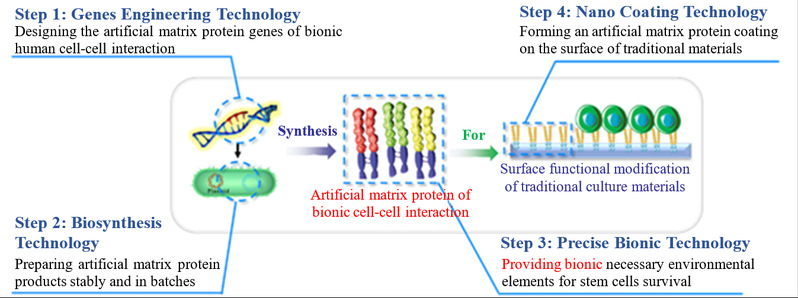Nankai Team Develops the Stem Cell Bionic Enabling System and Builds the New "Sunshine Room" for Stem Cell Culture in vitro
Professor Yang Jun's research team in the College of Life Sciences of Nankai University, on the basis of 20 years of continuous research, has developed a stem cell bionic enabling system that can simulate the microenvironment in vivo. The system has efficiently fixed the problems such as low efficiency, high cost, poor security and impairment of intergenerational function for stem cell culture in vitro, greatly advancing the research of stem cells into application. Qifu, a student’s innovative and entrepreneurial team led by the members of the research team, is dedicating to promoting the research results to the market.
 Figure 1 Microenvironmental model of Qifu stem cell bionic enabling system
Figure 1 Microenvironmental model of Qifu stem cell bionic enabling system
The research team selects several cell-cell interaction proteins to analyze their genes and protein sequences, then chooses several genes to construct fusion protein genes using genetic engineering technologies. The team prepares artificial matrix protein products stably and in batches through biosynthesis technologies and finally forms the artificial matrix protein coating to realize surface functional modification on the surface of traditional materials using the nano coating technologies.
Prepared by the team through advanced genetic engineering technologies, the core products boast clear and stable matrix components, over 95% production purity and human-derived proteins, which can better regulate human-derived stem cells and are safer. Meantime, Qifu stem cell enabling system has constructed the cell-cell interaction core proteins on a large scale and thus better realized the bionics of the microenvironment in vivo on the culture surface, so that the cell function can be maintained. What's more, Qifu products regulate the growth microenvironment of stem cells through the bionics of the cell-cell interaction proteins. It shortens the stem cell proliferation cycle and thus delays stem cell aging, greatly increases the number of available stem cells, expands the production scale of stem cells and reduces the production cost of stem cells and patients' waiting time.
So far, relevant technologies of the Qifu stem cell bionic enabling system have won more than 10 invention patents at home and abroad and more than 100 relevant scientific papers have been published.
Landmark papers:
https://onlinelibrary.wiley.com/doi/10.1002/adhm.201600114
https://pubs.rsc.org/en/content/articlelanding/2016/TB/C6TB00765A
https://www.sciencedirect.com/science/article/pii/S2352940720301372









